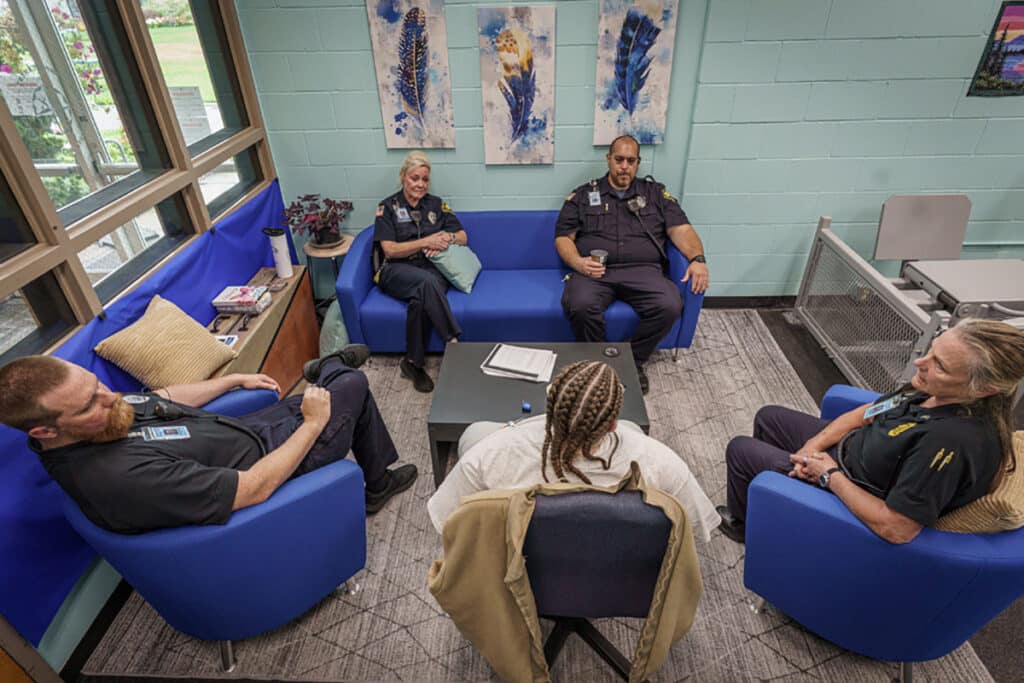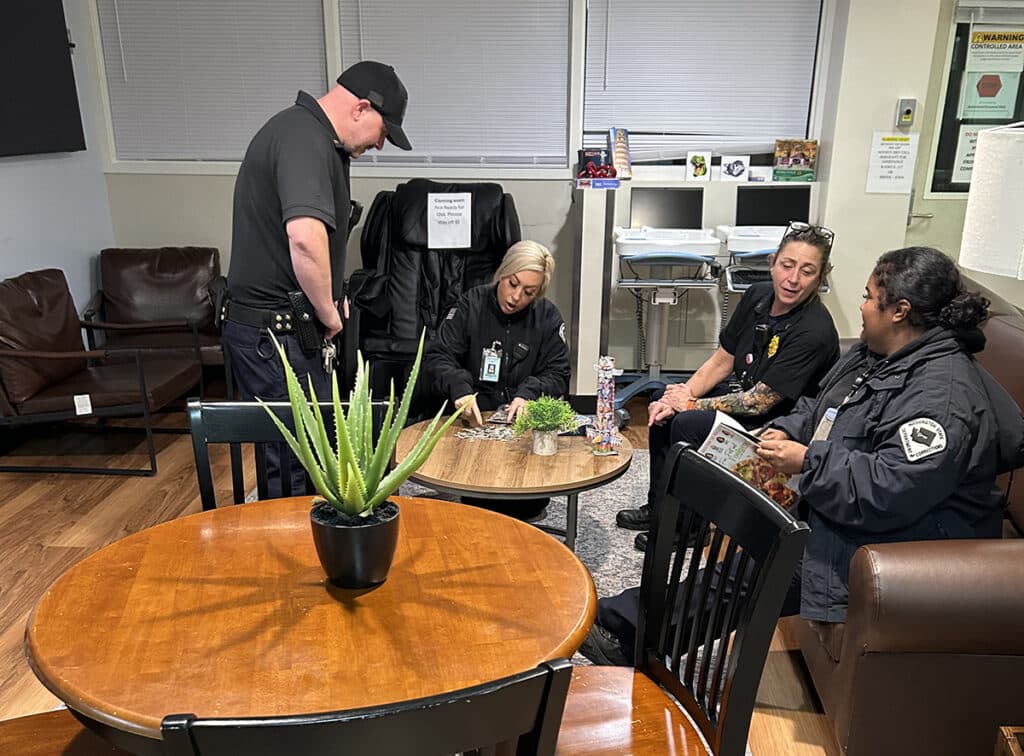Community Government Police & Fire
Washington Way program aims to make corrections centers healthier for everyone
A partnership between the Washington state Department of Corrections and a program at the University of California San Francisco is helping make the Washington Corrections Center for Women a better environment for both staff and incarcerated people.
Called Washington Way, the program aims to change the state’s prison culture and improve health and wellness. The Gig Harbor prison is one of six facilities participating in Washington Way.
Helping is Amend, a UCSF program that describes itself as “a public health and human rights program that works in prisons to reduce their debilitating health effects on residents and staff.”
Command and control
Amend researchers look at prison environments and how they impact the lives of staff and incarcerated people. Amend’s chief program officer Cyrus Ahalt said researchers found that the traditional approach of “command and control” contributed to negative health impacts for staff across the country. Those include PTSD, heart disease, substance abuse and depression and anxiety.

The activity team meets with a resident at the Washington Corrections Center for Women as part of the Washington Way Program’s initiative to change the culture of the prison. By creating social interactions that are more normal, as opposed to the strict “command and control” method, residents are more ready for release back into their communities. Photo courtesy of Jeff Fay for Amend at University of California San Francisco
“It creates a lot of stress,” said Courtney Grubb, administrator of Washington Way. “What (Amend founder) Dr. Brie Williams saw was staff dying before retirement, and they (Amend) saw that as an occupational health crisis. The way you interact (with incarcerated individuals), you’re trained to command and control.”
The command and control method specifies that staff spend no more than 30 seconds talking to an individual and refrain from being their authentic, real selves at work, Grubb said. Spending a whole work day in that mindset resulted in health issues, according to Amend.
Ahalt said researchers discovered a huge occupational health crisis within the country’s prison systems. Others have conducted similar research, and Ahalt said the results are the same.
“It now seems evident in literature: Staff are disproportionately likely to suffer from chronic stress conditions and behavioral health issues,” Ahalt said.
Norway shows the way
Amend looked for a better prison system that had better staff health outcomes. They landed in Norway in 2016. The Norwegian prison system is recognized as the most humane in the world, Ahalt said. Amend began a partnership with Norway’s prison system to learn more.
“They embody the public health approaches that we think are possible,” Ahalt said. “Their ethos is that you go to court to be punished, and you go to prison to become a better neighbor. That strikes us as different than the U.S. system. The Norwegian dedication to professionalism, and their working at a high level on the side of helping people make change in their lives and leave the prison better than they come in, that was appealing to us.”
Amend and DOC began conversations about a new approach in 2019. Staff visited Norway to learn more in 2020. Amend has a funding mechanism that covers immersive international training, and job shadowing.
The first group was ready to start training staff at Mission Creek Corrections Center in Belfair and Stafford Correctional Facility in Aberdeen in 2022.
“Certainly as they looked at the occupational health profile of their staff they looked at that and wanted to make some changes,” Ahalt said.

Beautification of the courtyard at the Washington Corrections Center for Women is part of an effort to create a better working environment for staff. Photo courtesy of Jeff Fay for Amend at University of California San Francisco
Change agents
At WCCW, staff volunteer for training to become change agents who focus on staff wellness. They submit ideas to their supervisors for ways to improve their work environment, Grubb said.
If a change agent’s idea aligns with Washington Way the program looks for a way to fund and implement the idea. The prison’s tattoo removal program is an example of it in action.
“Everything we do is from a staff wellness lens, and the byproduct is that we improve the environment for all,” Grubb said.
Tami Ferguson of Gig Harbor is one of the change agents. She has worked at the facility for 17 years, currently as the mobile activity team sergeant, and is excited for the changes.
Creating a more normalized environment within the prison makes sense to Ferguson.
“We’ve done a lot of normalization,” Ferguson said. “I work with the offenders more than anything, and I work specifically with higher-risk, higher-needs offenders. My job is to work with these individuals that are maybe having trouble with coping skills, and staying out of trouble. My team works with these individuals to show a more normal way of life, and in turn they look at us as staff differently.”
Preparing to re-integrate
Some of the high-risk, high-needs residents are dealing with abandonment issues or codependency, she said.
“We are not clinicians, so we find resources for them,” Ferguson said. “We sit down and have a cup of coffee with them, or play a game of cards.”
The change in culture led to more normal interactions between staff and incarcerated individuals. Ferguson said that is important for everyone, especially residents nearing release. After years of prison interactions, they may find adjusting to daily social interactions on the outside difficult.
Another Washington Way innovation is the creation of the contact officers, Ferguson said. These officers work as mentors and role models for a small number of residents. Allowing staff to handle the needs of incarcerated individuals created an easier work culture, Ferguson said.
“Our mental health programs are not enough, so contact staff takes a tremendous load off the units,” she said. “Someone preparing for release may want to meet once a week to get their ducks in a row. Having the contact staff as mentors just that kind of stuff creates a softer, easier environment.”
Positive atmosphere
Kaleena Jones of Gig Harbor, an administrative assistant to the superintendent, is another change agent. She has noticed a more positive atmosphere for staff.
“We had break areas before, but they were sparse,” she said. “These new areas, the break room, and the respite room, they give staff a place to be, and decompress. That is huge here. We have a little bit of what we have on the outside, and we’re able to heat up meals in a new microwave, and it has helped tremendously with staff morale.”

The staff room at the Washington Corrections Center for Women has new furniture and appliances. The updated room is one of the Washington Way Program’s efforts to create a better working environment for staff. Photo by Washington Department of Corrections
Ferguson has also seen a boost in staff morale. By creating a nice break room, as well as a place for staff to rest when they are working an overtime shift, she said the work environment has improved.
A lot of the staff at WCCW commute long distances, making the turnaround for the next shift short when working overtime. Providing a place for staff to relax and rest has been a game changer.
“They brought in a nice refrigerator for the staff,” she said. “We don’t have to worry anymore whether it will keep our food cold. Little things make it easier to go to work and feel appreciated.”
Jones said the staff puts on a holiday music program for the incarcerated individuals, and tries to bring cheer during a time of year that is sad for a lot of them.
“Staff dress up in ugly Christmas sweaters, and perform in the gym,” she said. “It brings cheer for the staff and population as well.”
